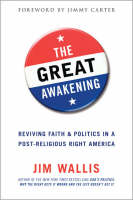|
|
religion, politics & state
|
|



|
|
| book details |
The Great Awakening: Reviving Faith and Politics in a Post-Religious Right America
By (author) Jim Wallis

|
This book is currently unavailable. Enquire to check if we can source a used copy
|
| book description |
The ""New York Times""-bestselling author of ""God's Politics"" reinvigorates America's hope for the future, offering a roadmap to rediscover the nation's moral center and providing the inspiration and a concrete plan to change today's politics.
| product details |
Normally shipped |
Publisher | HarperCollins Publishers Inc
Published date | 22 Jan 2008
Language |
Format | Hardback
Pages | 352
Dimensions | 229 x 152 x 29mm (L x W x H)
Weight | 581g
ISBN | 978-0-0605-5829-1
Readership Age |
BISAC | religion / religion, politics & state
| other options |
|
|
|
To view the items in your trolley please sign in.
| sign in |
|
|
|
| specials |
|

|
Mason Coile
Paperback / softback
224 pages
was: R 520.95
now: R 468.95
|
A terrifying locked-room mystery set in a remote outpost on Mars.
|
|
An epic love story with the pulse of a thriller that asks: what would you risk for a second chance at first love?
|
|
|
|
|